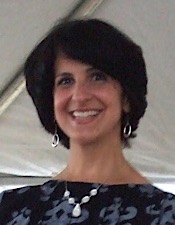Tami Carsillo
When it comes to an ideal board president for Africa ELI, Tami Carsillo checks all the boxes. Her education, experience, and interests are well aligned with Africa ELI’s mission and objectives. Tami was elected board president earlier this year, having served as a Program and Strategy Consultant with Africa ELI since 2016. She is currently a doctoral student in International Education at George Mason University, and holds a master’s degree in Teaching and a bachelor’s degree in History. Tami has conducted extensive research in the area of education in conflict-prone countries, and has published papers and presented at conferences on the subject of education in South Sudan.
As a way to introduce Tami to the Africa ELI community, I got together with her for a quick question and answer session.
Q: How did you first become familiar with Africa ELI?
A: It was meant to be! In 2013, I interviewed a former co-worker, named Maker, at the Virginia State Capitol for my doctoral qualitative research methods course. Maker is from South Sudan and had founded a school in Rumbek. He recommended I interview with Jennifer, a woman from his church who had helped with the school, and she knew Anita! More than anything, I wanted and needed to go to South Sudan. Let’s be honest, there was no way I could continue to write about South Sudan education as a doctoral student and not go to South Sudan –– I needed to connect the theoretical with the practical applications. Anita and I connected (thanks Jennifer!) and we realized within five minutes on the phone that we were meant to know each other. She is my soul sister! I’ve been connected to Africa ELI ever since. I even did my doctoral internship with Africa ELI. I couldn’t be more honored or proud to be Africa Eli’s board president.
Q: Your main area of interest is education in conflict-prone countries. What draws you to that subject and to South Sudan in particular?
A: I’m fascinated by what motivates people to be active and engaged participants in their lives and with their governments. It may sound corny, but I truly believe in the saying “knowledge is power.” Education, whether formal or informal, offers us the power of self-determination and choice. There is so much to learn from the people of South Sudan. It is humbling to meet people who are dealing with day to day survival in a country torn by civil war. During my time in South Sudan, I’ve come to know students who fight each day to stay alive and who put the ability to go to school above so much else. That is to be respected, acknowledged, and learned from. So that, perhaps, while conflict can never be eradicated, we can better understand effective means of resolution and how education can be a part of it.
Q: What do you hope to achieve during your tenure as President of the Board of Directors for Africa ELI?
A: I want to keep us moving forward. Today, there are so many innovations and opportunities available to NGOs, and we, as Africa ELI, need to make sure we choose, and put to good use, what’s best for our students and programs. We have amazing board members, staff, and volunteers, all of whom possess valuable skills and are dedicated to our mission. We are all part of the whole that is Africa ELI. I feel that my main responsibility is to make sure everyone has the space to share their talents.
[pjc_slideshow slide_type=”tami”]

